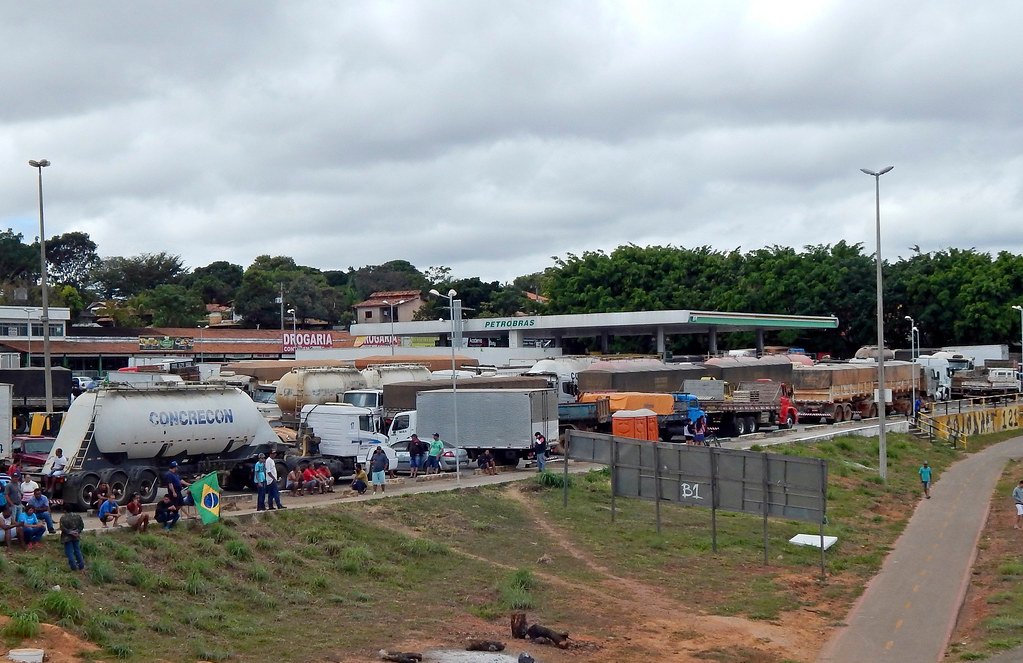Consecutive increases in fuel prices have been motivating truck drivers to call for strikes on several occasions. Only this year, many attempts have been made. In addition, app drivers, also pressured by the rises, have joined the cause earlier this year. On top of that, the movement in price, associated with the current crisis, could make the economic recovery a more difficult task for the government.
This Content Is Only For Subscribers
To unlock this content, subscribe to INTERLIRA Reports.
CONTINUOUS CALLS FOR STRIKES
On July 25th, a group of self-employed truck drivers from several parts of the country promoted a series of stoppages in at least 15 states. Although some actions affected important hubs, like Santos Port, the initiative did not manage to create a great impact. On August 4th, another similar protest happened, and it intended to block the traffic in Av. Brasil, in Rio de Janeiro. Truckers and app drivers were responsible for this blockage. The demonstration managed to partially close the avenue, but it didn’t reach its goal either. Both events had in common the intention to protest the consecutive increase in fuel prices.
Despite the low impact that both actions had, they indicate a dormant issue that has been looming over Brazil since the great truckers strike of May 2018. Following this event, dozens of strikes were called due to new price increases. Only in the last 12 months, diesel went up by 40%. In the same period, ethanol rose by 59%; and gasoline by 51%.
Application and truck drivers want the government to better manage the fuel prices fluctuation. The truckers’ main claim is the end of the Import Parity Price (PPI), which is used by Petrobras to calculate fuel prices. This policy follows price variations in the international market, and it is affected by the dollar rate. The measure seeks to keep Petrobras competitive, but it makes fuel more expensive and let drivers more vulnerable. For their turn, app drivers request, among other things, the end of the taxation of fuels and lubricants.
Even though discontent appears to be high, some factors may prevent the repetition of the 2018 scenario. First, there is a lack of cohesion between the self-employed truckers In addition, recent good harvests greatly stimulated the export of commodities and generated a lot of work for road transportation.
Furthermore, the pandemic may greatly weaken any popular support for a strike. Finally, because truckers and app drivers are self-employed, the stoppage is seen by some of them as a day of loss.
FUEL PRICES AND THE IMPACT ON THE ECONOMY
Since there are very few railways in Brazil, the circulation of goods is heavily dependent on road transportation. The increase in fuel prices creates pressure on truckers and app drivers and it also affects the whole population through inflation. The increase in fuel prices is transferred to other essential products, like food, creating worse living conditions during the crisis.
In May, the country’s misery index hit a record of 23,47 points, according to the Brazilian Institute of Geography and Statistics (IBGE). This negative record was triggered bythe percentage of unemployed citizens and by the high inflation rate: effect of fall in income and an increase in the cost of living at the same time. While unemployment hit its 2nd highest mark recorded (14,6%), inflation (IPCA) accumulated an 8,99% increase in 12 months, the highest since 2016. Fuel prices strongly contributed to this with a 41,2% increase in the last 12 months. The gas bottles, widely used by poor families to cook, also played an important part, its price increased by 29,3% in the same period.
PERSPECTIVES AND GOVERNMENT RESPONSE
On August 11th, President Jair Bolsonaro signed the Provisional Measure (MP) 1063/21, which allows ethanol to be sold directly by manufacturers to consumers. In addition, the MP allows branded stations to resell gasoline from different manufacturers. In addition, on August 12th, Bolsonaro promised to reduce federal taxes (PIS /Cofins) on diesel to zero as of January 2022.
According to economists, if the state fails to control the escalation in fuel prices, the results could lead to an increase in interest rates and a credit reduction. Since Brazil is in the middle of a crisis, it needs more credit to stimulate economic growth. Increases in interest rates would make it harder for the country to complete its economic recovery. This context could get even worse if associated with eventual strikes of strategic groups, such as truck drivers.




